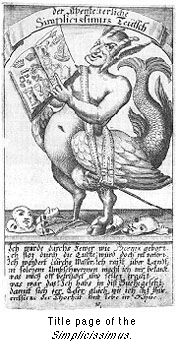The Thirty Years' War
A devastating period of war in Europe, particularly in Germany, from 1618 to 1648.
At the beginning of the 17th century Europe was in transition from feudalism towards bourgeois republicanism and nationalism. The contrast ranged from the republican, commerce-oriented, protestant Netherlands to feudal, autocratic, catholic Spain. Between these extremes were catholic Habsburg of Austria and protestant Saxony and Sweden.
The myriad of small potentates in Germany could not pursue their economical interests without outside support of one of the major forces and tended to invite military intervention, usually using religion as a guide for selecting the invited power. This made Germany the battlefield for a most savage conflict, during which all European powers tried to gain hegemony.
Most armies of the Thirty Years' War were mercenary armies without pay, who cruelly plundered the countryside, often forcing the population to starve. (General Wallenstein is reported to have said that it is easier to feed an army of 20,000 than an army of 2,000 men.) As a result normal norms of civilization were no longer upheld and Germany plunged into one of its darkest periods.
Several phases are identified, based on the major warring parties:
- Bohemian - Palatian War (1618 - 1623),
- Lower German - Danish War (1625 - 1629),
- Swedish War (1930 - 1636), and
- Swedish - French War (1635 - 1648).
Throughout these periods peasant revolts tried unsuccessfully to expel the marauding armies from their lands.
When the continent was exhausted, the peace of Westphalia painted a totally new picture of European power: The United Netherlands were recognized as an independent republic, Spain had lost most of its power, Sweden controlled the north, France was the leading power in the west, and for the next 200 years a fragmented Germany was eliminated as a European power of consequence.
 The German writer Hans Jacob Christoph von Grimmelshausen (b. 1621/1623 in Gelnhausen near Frankfurt am Main, d. 17 August 1676 in Renchen near Strasbourg) painted a frightening but true picture of Germany during the Thirty Years' War. His novel Simplicissimus is one of the masterpieces of German literature.
The German writer Hans Jacob Christoph von Grimmelshausen (b. 1621/1623 in Gelnhausen near Frankfurt am Main, d. 17 August 1676 in Renchen near Strasbourg) painted a frightening but true picture of Germany during the Thirty Years' War. His novel Simplicissimus is one of the masterpieces of German literature.
Grimmelshausen was orphaned at an early age and kidnapped into the War by Hessian and Croatian troops. He joined the imperial army as a musketeer and became secretary to the commandant at Offenburg, Reinhard von Schauenburg. After the war he survived first in the service of von Schauenburg, collecting taxes from peasants, bringing defaulters to court, running a tavern and selling horses. He left in 1660 when it transpired that he had used his employers' money to buy land for himself. He continued as an innkeeper and bailiff.
Grimmelshausen began writing during his army days. The first part of his Simplicissimus came out in 1669, but his authorship was only established in 1837 when the initials HJCVG of the editor were recognised as identifying him as the author. The work follows the life of a man through Germany in the process of depopulation and governed by depravity, superstition and fear. Full of earthly humour and strong satire, the work includes scenes of utmost cruelty, which more likely than not reflect the true state of European civilization at the time.
home
 The German writer Hans Jacob Christoph von Grimmelshausen (b. 1621/1623 in Gelnhausen near Frankfurt am Main, d. 17 August 1676 in Renchen near Strasbourg) painted a frightening but true picture of Germany during the Thirty Years' War. His novel Simplicissimus is one of the masterpieces of German literature.
The German writer Hans Jacob Christoph von Grimmelshausen (b. 1621/1623 in Gelnhausen near Frankfurt am Main, d. 17 August 1676 in Renchen near Strasbourg) painted a frightening but true picture of Germany during the Thirty Years' War. His novel Simplicissimus is one of the masterpieces of German literature.